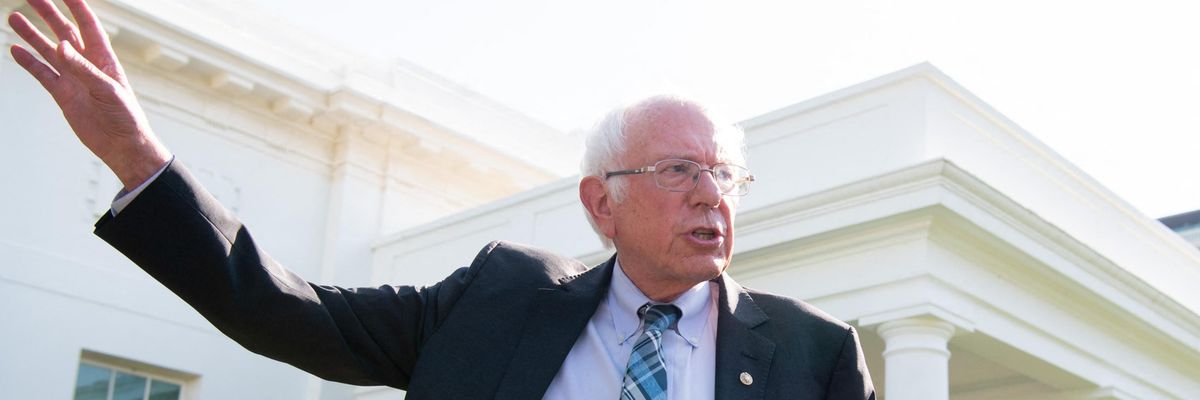
U.S. Sen. Bernie Sanders (I-Vt.) speaks to the media outside the West Wing of the White House in Washington, D.C. on July 12, 2021, after attending a meeting with President Joe Biden. (Photo: Saul Loeb/AFP via Getty Images)
Bernie Sanders Explains Why Most Media Coverage of Reconciliation Fight Is Corporate Con Job
"There's a big disconnect between the corporate media and working people," said the senator.
\u201cThere's a big disconnect between the corporate media and working people. Across America, people work 50-60 hours a week, can't afford child care, have no health care, and they turn on the TV and the media says 'everything is great!' because corporations are making record profits.\u201d— Bernie Sanders (@Bernie Sanders) 1633386300
"When we talk about big money controlling this country, it's not only the direct political process but it's how we even learn about what's going on in this country."
--Sen. Bernie Sanders
\u201cMaybe, if youre lucky, expanded dental, vision and hearing coverage, universal pre-K, expanding Medicare, 2 years of free community college, will be brought up in paragraph 7. The framing is all about jockeying between political forces, no sense of the human impact on poverty\u201d— Adam H. Johnson (@Adam H. Johnson) 1633393933
An Urgent Message From Our Co-Founder
Dear Common Dreams reader, The U.S. is on a fast track to authoritarianism like nothing I've ever seen. Meanwhile, corporate news outlets are utterly capitulating to Trump, twisting their coverage to avoid drawing his ire while lining up to stuff cash in his pockets. That's why I believe that Common Dreams is doing the best and most consequential reporting that we've ever done. Our small but mighty team is a progressive reporting powerhouse, covering the news every day that the corporate media never will. Our mission has always been simple: To inform. To inspire. And to ignite change for the common good. Now here's the key piece that I want all our readers to understand: None of this would be possible without your financial support. That's not just some fundraising cliche. It's the absolute and literal truth. We don't accept corporate advertising and never will. We don't have a paywall because we don't think people should be blocked from critical news based on their ability to pay. Everything we do is funded by the donations of readers like you. Will you donate now to help power the nonprofit, independent reporting of Common Dreams? Thank you for being a vital member of our community. Together, we can keep independent journalism alive when it’s needed most. - Craig Brown, Co-founder |
\u201cThere's a big disconnect between the corporate media and working people. Across America, people work 50-60 hours a week, can't afford child care, have no health care, and they turn on the TV and the media says 'everything is great!' because corporations are making record profits.\u201d— Bernie Sanders (@Bernie Sanders) 1633386300
"When we talk about big money controlling this country, it's not only the direct political process but it's how we even learn about what's going on in this country."
--Sen. Bernie Sanders
\u201cMaybe, if youre lucky, expanded dental, vision and hearing coverage, universal pre-K, expanding Medicare, 2 years of free community college, will be brought up in paragraph 7. The framing is all about jockeying between political forces, no sense of the human impact on poverty\u201d— Adam H. Johnson (@Adam H. Johnson) 1633393933
\u201cThere's a big disconnect between the corporate media and working people. Across America, people work 50-60 hours a week, can't afford child care, have no health care, and they turn on the TV and the media says 'everything is great!' because corporations are making record profits.\u201d— Bernie Sanders (@Bernie Sanders) 1633386300
"When we talk about big money controlling this country, it's not only the direct political process but it's how we even learn about what's going on in this country."
--Sen. Bernie Sanders
\u201cMaybe, if youre lucky, expanded dental, vision and hearing coverage, universal pre-K, expanding Medicare, 2 years of free community college, will be brought up in paragraph 7. The framing is all about jockeying between political forces, no sense of the human impact on poverty\u201d— Adam H. Johnson (@Adam H. Johnson) 1633393933

